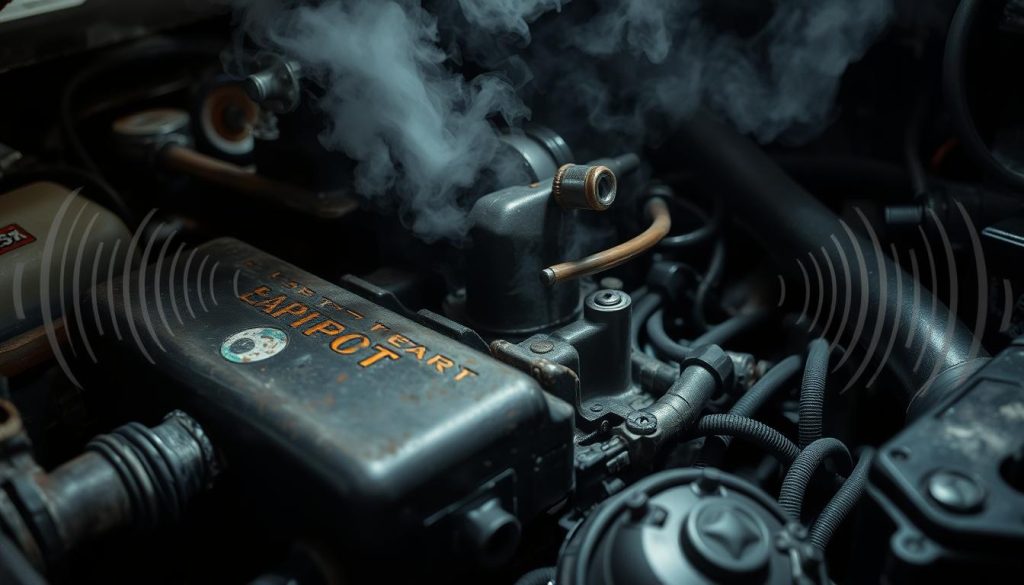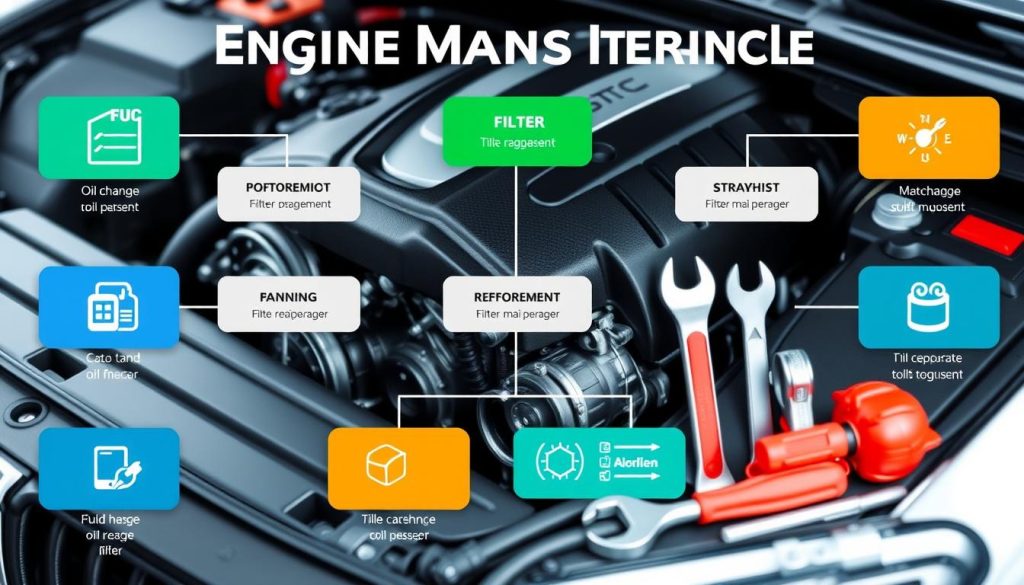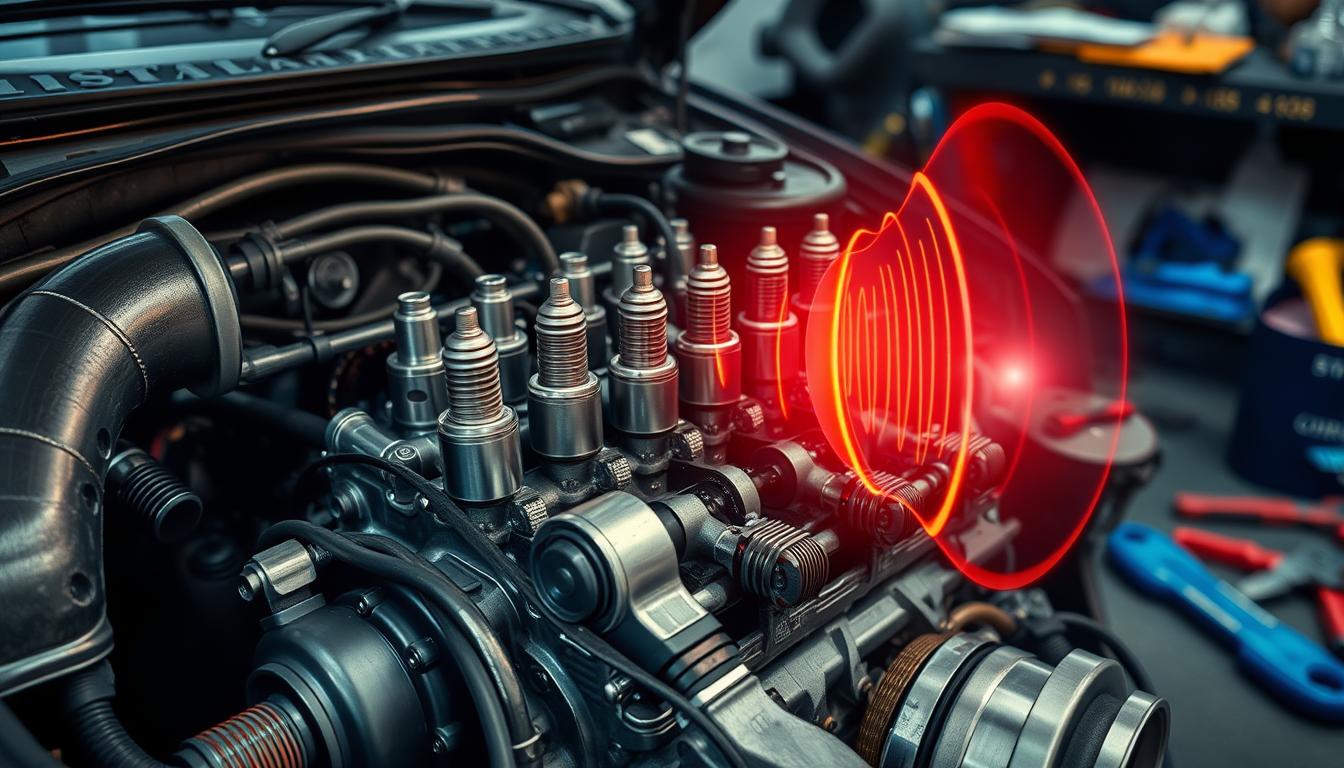Your car’s engine is akin to its heartbeat, pulsating with life when all is well. Yet, unusual noises can herald impending trouble. Grasping the significance of car engine sounds is essential for every driver. It transcends mere avoidance of breakdowns, touching upon safety and the financial aspect of repairs.
Engine diagnostics frequently commence with auditory cues. That peculiar rattle or whine might be your car’s silent plea for assistance. By attuning to these sounds, you can identify issues before they escalate. This proactive stance towards vehicle maintenance can avert minor problems from morphing into significant challenges.
Discerning various engine sounds necessitates practice. Some are benign, while others demand immediate attention. Acquiring the ability to differentiate between them is a skill every car owner should cultivate. It grants you the power to make informed decisions regarding your vehicle’s upkeep.
Key Takeaways
- Unusual car engine noises often indicate impending issues
- Early detection through sound can prevent costly repairs
- Engine diagnostics begin with listening to your vehicle
- Not all engine sounds are cause for concern
- Understanding different noises aids in vehicle maintenance
- Prompt attention to strange sounds can enhance safety
Common Car Engine Noises and Their Significance
Car engines communicate through distinct sounds. Recognizing these signals can avert expensive repairs. Let’s dissect some prevalent engine noises and their implications.
Clicking and Ticking Sounds
Engine clicking typically indicates low oil pressure or deteriorating engine parts. Initially, the sound may be faint but intensifies with time. Persistent clicking necessitates an immediate check of your oil levels.
Knocking and Banging Noises
Knocking in the engine is a critical warning sign. It could signify damaged bearings or pistons. This metallic clashing sound demands prompt attention. Ignoring it may result in engine failure. If you encounter knocking, cease driving and seek a mechanic’s assistance.
Squealing and Screeching Sounds
A squealing engine usually signals belt issues. Loose or frayed belts produce this high-pitched whine. The sound is most pronounced during startup or when accelerating. Timely replacement of worn belts can prevent engine failure.
| Sound | Possible Cause | Action Needed |
|---|---|---|
| Clicking | Low oil pressure | Check oil level |
| Knocking | Damaged bearings | Stop driving, call mechanic |
| Squealing | Worn belts | Replace belts |
Early identification of these sounds can avert significant engine damage. Regular maintenance is essential to maintain your engine’s health and silence.
Understanding Your Car Engine’s Warning Signs
Your car’s engine is akin to its heart, signaling distress through various means. Identifying these signs early can avert expensive repairs. Let’s dissect how to identify trouble before it escalates.
Dashboard lights serve as your initial defense mechanism. The check engine light, often misunderstood, is vital for car diagnostics. Its illumination necessitates immediate attention. Gauges for oil pressure and temperature also signal engine malfunctions.
Performance alterations are another indicator. A sudden decline in fuel efficiency or power could signal engine issues. Rough idling, stalling, or difficulty in starting are clear warnings.
Unusual odors often accompany engine problems. A burning smell might indicate overheating, while a sweet aroma could suggest coolant leaks. An immediate response is required if you detect a gas smell.
| Warning Sign | Possible Issue | Action Needed |
|---|---|---|
| Check Engine Light | Various engine problems | Diagnostic scan |
| Blue Smoke | Oil burning | Check oil levels |
| Vibrations | Misfiring cylinders | Inspect spark plugs |
| Reduced Power | Clogged fuel filter | Replace filter |
Early detection is imperative. Regular maintenance and vigilance towards these warning signs can prevent minor issues from escalating. Don’t wait for a breakdown before addressing concerns.
Identifying Dangerous Engine Sounds vs Normal Operation
It is essential for every car owner to distinguish between harmful engine noises and those that are merely normal. This distinction can prevent expensive repairs and avert engine emergencies.
Critical Sound Patterns to Watch For
Immediate attention is required for certain dangerous engine noises, including:
- Loud knocking or banging
- High-pitched squealing
- Persistent clicking or tapping
- Grinding or scraping sounds

Normal Engine Operation Sounds
Not all engine sounds warrant concern. Normal engine sounds typically include:
- Soft humming or purring
- Gentle ticking when idling
- Brief hissing after shutoff
When to Take Immediate Action
If you encounter any unusual or loud noises, it is advisable to cease driving and seek professional assistance. Neglecting these sounds can result in severe engine damage or unexpected breakdowns.
| Sound | Possible Cause | Action Required |
|---|---|---|
| Loud knocking | Damaged rod bearings | Immediate stop and tow |
| High-pitched squeal | Loose or worn belt | Safe to drive short distance |
| Grinding | Low oil or transmission issues | Stop and check fluids |
Early detection of dangerous engine noises can avert costly repairs and ensure your safety on the road. In cases of uncertainty, consulting a professional mechanic for diagnosis is advisable.
Diagnosing Problems Based on Engine Location
Identifying engine issues begins with pinpointing the source of the sound. Engine problem localization is key to narrowing down possible causes and streamlining the troubleshooting process. We will examine how various engine areas can signal specific problems.
Noises emanating from the front of the engine often point to issues with the timing chain, water pump, or alternator. A rattling sound might suggest a loose timing chain, while a high-pitched whine could indicate alternator problems.
At the top of the engine, ticking or tapping noises typically signify valve train issues. These could be due to low oil pressure or worn valve lifters, necessitating immediate attention to avert further damage.
Knocking sounds from the sides usually indicate problems with pistons or connecting rods. These are critical issues that demand immediate professional evaluation.
| Engine Area | Common Issues | Typical Sounds |
|---|---|---|
| Front | Timing chain, water pump, alternator | Rattling, whining |
| Top | Valve train, oil pressure | Ticking, tapping |
| Side | Pistons, connecting rods | Knocking |
Grasping the relationship between car engine components and their sounds is essential for effective engine troubleshooting. By pinpointing the location of unusual noises, you can more effectively communicate with mechanics. This approach can potentially save time and money on repairs.
Impact of Different Weather Conditions on Engine Sounds
Weather significantly influences your car engine’s performance and sound. Grasping these weather effects on engines aids in better vehicle maintenance and prevents future issues.
Cold Weather Effects
In winter, cold start engine noises are prevalent. As temperatures decline, oil viscosity increases, hindering engine part movement. This results in a ticking sound until the engine warms up. In severe cold, a squealing noise from the serpentine belt may occur due to its stiffness.
Hot Weather Influences
Hot weather engine problems manifest as distinct sounds. A knocking noise may occur if the engine overheats. This is due to metal parts expanding and rubbing against each other. Fan belts also tend to squeal more in hot weather, stretching and wearing faster.
Humidity and Rain Considerations
High humidity can impact your engine’s performance. You might observe a slight power decrease or unusual sounds if moisture enters the fuel system. Heavy rain can lead to splashing noises if water enters the exhaust system.
| Weather Condition | Engine Sound | Possible Cause |
|---|---|---|
| Cold | Ticking | Thickened oil |
| Hot | Knocking | Overheating |
| Humid | Sputtering | Moisture in fuel system |
| Rainy | Splashing | Water in exhaust |
By recognizing these weather-related engine sounds, you can enhance your vehicle’s care. This proactive approach helps address issues before they escalate into major problems.
Prevention and Maintenance Tips for a Quiet Car Engine
To maintain a quiet car engine, regular maintenance and preventive care are essential. Adhering to these quiet engine tips can prevent costly repairs and ensure a smooth ride.
Regular Maintenance Schedule
Adopting a consistent maintenance routine is vital for a smooth engine operation. This entails regular checks on fluid levels, belt inspections, and prompt responses to any unusual sounds. A well-maintained engine is less prone to producing unwanted noises.

Oil Change Importance
Regular oil changes are critical for engine health. Fresh oil lubricates engine parts, reducing friction and noise. Adhering to your vehicle’s recommended oil change intervals is key to maintaining optimal engine performance.
| Oil Type | Change Interval | Benefits |
|---|---|---|
| Conventional | 3,000-5,000 miles | Basic protection |
| Synthetic Blend | 5,000-7,500 miles | Enhanced performance |
| Full Synthetic | 7,500-15,000 miles | Superior protection |
Belt and Bearing Care
Proper care of belts and bearings is critical for a quiet engine. Replacing worn belts prevents squealing noises. Regular lubrication of bearings reduces friction and eliminates unwanted sounds. These actions can greatly enhance your engine’s performance and longevity.
- Inspect belts for cracks or fraying
- Check tension of serpentine and timing belts
- Listen for unusual bearing noises
- Grease bearings according to manufacturer specifications
When to Seek Professional Help
Car engines are complex, and sometimes, it’s wise to entrust diagnosis and repairs to experts. Recognizing when to seek professional engine diagnosis is vital for your vehicle’s health and to prevent costly repairs later.
Notice persistent unusual noises, smoke from the exhaust, or a significant drop in performance? It’s time to consult an auto mechanic. These symptoms often signal serious issues that need specialized tools and expertise for accurate diagnosis.
When choosing engine repair services, seek certified professionals with positive reviews and clear pricing. A reputable mechanic will clearly explain the problem and provide a detailed estimate before commencing any work.
“Regular maintenance by a skilled professional can prevent minor issues from escalating into major repairs.”
Here are some situations that demand immediate professional attention:
- Check engine light stays on
- Engine misfires or stalls frequently
- Unusual vibrations while driving
- Sudden decrease in fuel efficiency
- Fluid leaks under the vehicle
Remember, attempting DIY repairs without proper knowledge can lead to more damage. Trust your vehicle to experienced professionals who can accurately diagnose and fix engine problems. This ensures your car’s longevity and your safety on the road.
| Warning Sign | Possible Issue | Professional Service Needed |
|---|---|---|
| Knocking sound | Rod bearing failure | Engine rebuild or replacement |
| Blue exhaust smoke | Oil burning in combustion chamber | Valve seal or piston ring replacement |
| Loss of power | Fuel system or compression problems | Fuel injection service or engine compression test |
Cost Implications of Ignoring Engine Sounds
Ignoring unusual engine noises can lead to substantial car maintenance expenses. Understanding the financial impact of addressing issues promptly versus delaying can save you thousands. This knowledge is invaluable for long-term savings.
Minor Repair Costs
Timely resolution of minor engine issues often results in lower repair costs. Simple fixes, such as replacing worn belts or tightening loose bearings, typically range from $100 to $500. These investments prevent more severe damage and maintain your vehicle’s performance.
Major Engine Damage Expenses
Ignoring minor problems can lead to significant engine damage. Rebuilding or replacing an engine due to severe wear or damage can cost between $2,500 and $4,000. In extreme cases, these costs might exceed the vehicle’s value.
Insurance Considerations
Auto insurance claims for engine damage can be complex. Most policies do not cover wear and tear or damage resulting from neglect. Regular maintenance and prompt attention to warning signs not only reduce repair costs but also prevent insurance claim denials.
| Repair Type | Average Cost | Potential Savings |
|---|---|---|
| Minor Repairs | $100 – $500 | $2,000 – $3,500 |
| Major Engine Work | $2,500 – $4,000 | N/A |
By being attentive to your car’s needs and addressing issues early, you can significantly reduce car maintenance expenses. This approach avoids costly engine repairs. Remember, prevention is always more cost-effective than cure in car maintenance.
Conclusion
Engine sound awareness is fundamental to preserving your vehicle’s integrity. Recognizing unusual noises allows for early detection of issues, potentially averting expensive repairs. Each sound emanating from your car conveys vital information about its state of health.
Consistent maintenance and timely interventions are indispensable for extending your car’s lifespan. Neglecting odd sounds or delaying oil changes can lead to severe complications. These preventive measures are essential for maintaining your engine’s performance and longevity.
Understanding the language of your car’s sounds is a critical skill for every driver. By being attentive and proactive, you can ensure your vehicle remains in optimal condition. This approach guarantees a smooth driving experience for many years to come.
Ultimately, dedicating a bit of time to your car’s maintenance can yield significant rewards. By remaining vigilant and adhering to regular maintenance schedules, your vehicle will reward you with years of dependable service. Your wallet will also benefit from the savings on costly repairs.

Leave a Reply